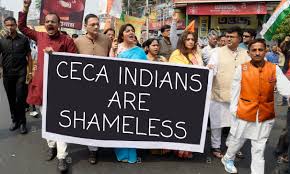RCEP trade pact in India’s interest as it gives access to Chinese market, Australia says

The Print - 17 July 2019
RCEP trade pact in India’s interest as it gives access to Chinese market, Australia says
By Nayanima Basu
New Delhi should embrace the Regional Comprehensive Economic Partnership (RCEP) to have effective access to the Chinese market that it is now lacking, the Australian High Commissioner to India Harinder Sidhu told ThePrint Tuesday.
The RCEP is a mega free trade agreement (FTA) that is presently being negotiated between the 10 ASEAN (Association of Southeast Asian Nations) members and their six trading partners — India, China, Australia, New Zealand, Japan and South Korea. The talks for RCEP were launched in 2012.
“India very often is concerned about the extent of access it gets to markets in China. The RCEP is a vehicle to allow that access because free trade agreements are binding,” the Australian envoy said during an exclusive interaction with ThePrint. “India should see it as a positive thing.”
A ministerial meeting on RCEP is scheduled to take place in Beijing on 2 and 3 August. The last round of talks was held in Melbourne, Australia, on 3 July even as members have decided to intensify the talks in order to conclude the pact by December this year.
India, however, has had apprehensions regarding the RCEP. Commerce and Industry Minister Piyush Goyal had last Tuesday stated that the Indian industry is not keen on having the RCEP as they believe it will not create a win-win situation for India. Goyal had raised these issues during the India-ASEAN Troika Trade Ministers’ meeting that took place here earlier this month.
Sidhu called for a change in India’s position. “There needs to be a paradigm shift here. A free trade agreement can be seen as a defensive tool or as a proactive tool. A free trade agreement is a tool to allow India better and smoother access into markets that it may not already have,” the Australian envoy said adding that RCEP will give Indian industry an opportunity “to expand and gain more productivity”.
India is negotiating a bilateral trade agreement with Australia — the Comprehensive Economic Cooperation Agreement (CECA) — the talks for which began in 2011.
According to Sidhu, while the negotiations on the CECA has been on hold for some time now, bilateral trade between India and Australia has been registering an annual growth of 15 per cent year-on-year for the last five years. She also said that Australia recently opened up its markets for Indian mangoes and grapes to be exported there.
‘Deeper defence collaboration’
The envoy further said Australia is hopeful that both sides will be able to conclude the talks for having a ‘Mutual Logistics Support Agreement’ in the next year. The agreement would allow for greater defence collaboration between the two countries while allowing for large-scale joint military exercises.
“The mutual logistics support agreement will give us a stronger foundation at this stage,” Sidhu said. “We are looking for a no more and no less in this agreement for the way we operate together when we conduct exercises. So under this mechanism, we do not have to sign a whole bunch of contracts to make a joint exercise happen.”
India and Australia had concluded their biennial maritime defence exercise — AUSINDEX – in April ; this year’s exercise saw the participation of frontline ships, submarine and a whole range of maritime patrol and reconnaissance aircraft.
On the contentious issue of Australia being a part of the ‘Malabar’ exercise, a naval event that began between Indian and US forces and later expanded to include Japan, the country had made several requests to India for it to be included in it but New Delhi is opposed to the move.
“We have always said we are keen on joining exercise ‘Malabar’ if we are invited by the parties. But that’s not a decision for us to make,” the Australian envoy said. “It is a decision for the parties to make. Whatever decision they make we will respect it but it’s not to say that is the only way to begin work in other formats. So there are many other opportunities.”





